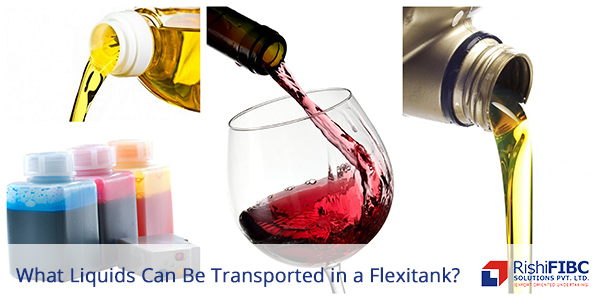What Liquids Can Be Transported in a Flexitank?
Flexitanks are a very effective, efficient and secure means of transporting liquids in bulk. They are a popular means of maritime transport in today’s world. It generally allows you to transport anything between 10,000 and 24,000 liters at a time. Rishi FIBC, based out of Vadodara and now also Mysore, is a prominent manufacturer and exporter of flexitanks in India.
A flexitank is also known as a flexitanque and a flexibag in some circles. It is basically a large container or a flexible tank bag that can transform conventional 20’DV in an efficient and safe marine transportation system which is used mainly in the transportation of bulk liquids.
Advantages of Flexitanks
- They can be used as a nice alternative to IBCs, drums, tank-containers and railway/road tanks.
- Expenses for transportation of liquid material will be greatly reduced if you choose to use flexitanks by Rishi FIBC.
- Flexitanks can help you to save upto 90% of the time involved in loading and unloading of the cargo.
- Flexitanks don’t need to be cleaned after transportation because they are disposable.
- Flexitanks also offer increased volume of cargo for transportation as compared to canisters and drums.
What is The Capacity of a Flexitank?
A flexitank can allow you to transport anything between 10,000 and 24,000 liters of liquid. However, the most popular and common models used today are 16,000 liters model, 18,000 liters model, 20,000 liters model, 22,000 liters model and 24,000 liters model. Generally, it is always best to choose the model with higher capacity but always remember to keep in mind the density of the flexitank you choose.
For more information take a look at our blog: The Capacity of Flexitanks
What are The Liquids which can safely be Transported in Flexitanks?
Basically flexitanks are perfect for carrying any type of liquid as long as it can be classified as non-dangerous. All the liquids that can be safely transported are as follows:
| Lactic acid | Palm oil | Vegetable oils |
| Waxes | Additives | White oils |
| Transformer oils | Ricinoleic acid | Drinking water |
| Sweeteners | Natural latex | Detergents |
| Glycerols | Synthetic latex | Fruit concentrates |
| Emulsions | Aluminum Chlorohydroxide | Malt extract |
| Paraffins | Sorbitol | Lubricants |
| Polyols | Printing ink | Musts |
| Non-hazardous chemicals | Edible oils | Wine |
Basically, it is appropriate to transport substances like edible and animal oils, juice concentrates, food, syrups, industrial oils, water, animal fats, ink, juices, glycerin, pharmaceuticals, latex, wine, food additives, oils, malt, sorbitol, additives, cleaning liquid, emulsions and fertilizers among others. Today, flexitanks are used to transport all non-hazardous liquids, which can be used for food application and industrial purposes.
Some liquids have certain properties which make them thicken when they are stored at low temperatures. If these liquids do thicken, the cargo contained in the flexitanks will take a long time to empty. This is exactly why Rishi FIBC has flexitanks installed with heating pads. They are put into use just before the flexitanks have to be emptied out and they basically work by emptying hot water or steam inside in order to increase temperature of the cargo material.




Leave a Reply
Want to join the discussion?Feel free to contribute!